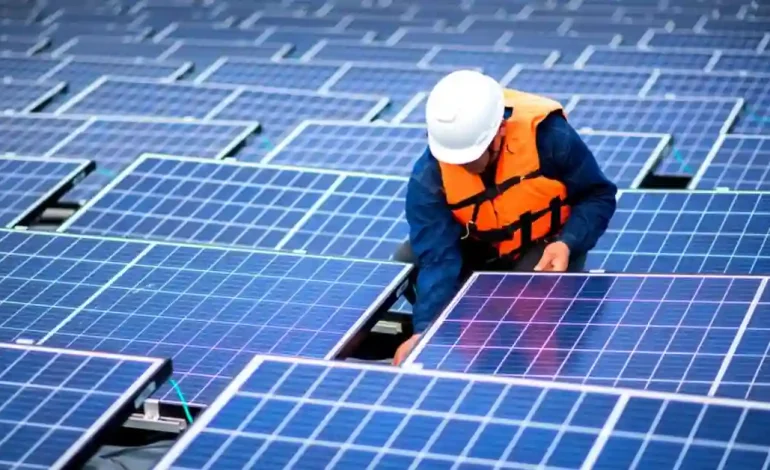The Benefits of Solar Panel Ownership vs. Leasing: Making an Informed Choice

Solar energy has become a popular and environmentally friendly way to power homes and businesses. When considering solar adoption, one of the fundamental decisions homeowners face is whether to own solar panels outright or opt for a leasing arrangement. Both options have their advantages, but making an informed choice requires understanding the benefits and trade-offs associated with each. In this article, we will explore the pros and cons of solar panel ownership and leasing to help you make a decision that aligns with your energy goals and financial situation.
Solar Panel Ownership
Pros of Solar Panel Ownership:
- Energy Savings and Return on Investment (ROI): Perhaps the most significant advantage of owning solar panels is the potential for long-term energy cost savings. When you own solar panels, you generate your electricity, reducing or even eliminating your reliance on grid electricity. Over time, the energy savings can lead to a positive ROI, making solar panel ownership a smart financial decision.
- Increased Property Value: Solar panels can increase the resale value of your home. Studies have shown that homes with solar installations tend to sell for more than those without. Buyers are often willing to pay a premium for homes with lower energy costs and sustainable features.
- Tax Incentives and Credits: Many regions offer tax incentives and credits to homeowners who invest in solar panel systems. These financial incentives can significantly reduce the upfront cost of solar panel ownership, making it more accessible.
- Ownership of Renewable Energy Credits (RECs): When you own your solar panels, you have the right to claim the associated Renewable Energy Credits (RECs). RECs represent the environmental benefits of clean energy generation and can be sold or traded, providing an additional source of income.
- Control Over System Design and Maintenance: Solar panel owners have the flexibility to design their systems according to their specific energy needs and preferences. They also have control over maintenance and can ensure the system operates optimally.
Cons of Solar Panel Ownership:
- Upfront Costs: The initial investment required to purchase solar panels and have them installed can be a significant barrier for some homeowners. While tax incentives and financing options are available, the upfront cost remains a challenge.
- Maintenance Responsibilities: Solar panel owners are responsible for system maintenance and repairs. While modern solar panels are durable and require minimal maintenance, occasional cleaning and system checks are necessary to ensure optimal performance.
- Warranty and Repairs: If any component of the solar panel system fails after the warranty period expires, the homeowner is responsible for repair or replacement costs. It’s essential to factor this into your financial planning.
Solar Panel Leasing
Pros of Solar Panel Leasing:
- Lower Upfront Costs: Solar panel leasing arrangements typically require little to no upfront investment. This makes solar energy accessible to homeowners who may not have the financial resources to purchase a system outright.
- Maintenance and Repairs: Many solar leases include maintenance and repair services, relieving homeowners of these responsibilities. If a component of the system fails, the leasing company typically covers the costs.
- Predictable Monthly Payments: Solar leases often come with fixed monthly payments, allowing homeowners to budget for their energy costs more effectively. This predictability can be especially appealing for those on a tight budget.
- No Ownership Risk: Leasing provides homeowners with the benefits of solar energy without the risks associated with ownership. If the system underperforms or becomes obsolete, the leasing company is responsible for addressing these issues.
Cons of Solar Panel Leasing:
- No ROI and Limited Savings: While leasing can reduce monthly electricity bills, it does not offer the same long-term savings and return on investment as ownership. Over time, homeowners may pay more for leased solar power than they would for grid electricity.
- No Property Value Increase: Leased solar panels do not typically increase the resale value of a home. In fact, some potential buyers may be hesitant to assume lease payments, potentially limiting the pool of interested buyers.
- Limited Control: Solar panel lessees have limited control over the system design and performance. The leasing company determines the system’s size and specifications, which may not align with the homeowner’s energy goals.
- Lease Terms and Commitments: Solar leases typically come with long-term commitments, often lasting 20 years or more. Exiting a lease prematurely can be challenging and costly, which may restrict homeowners’ options.
- Ownership of RECs: In most leasing arrangements, the leasing company retains the right to claim and sell the Renewable Energy Credits (RECs) associated with the solar energy generated. This means homeowners miss out on potential income from RECs.
Making an Informed Choice
When deciding between solar panel ownership and leasing, several factors should guide your decision:
- Financial Situation: Consider your budget and financial resources. If you can afford the upfront investment and are looking for long-term savings and investment returns, ownership may be the better choice. If you have budget constraints, leasing can provide immediate access to solar energy.
- Energy Goals: Assess your energy goals and preferences. If you want control over system design, ownership is the way to go. However, if simplicity and predictable monthly payments are more important, leasing might be suitable.
- Property Ownership: If you plan to stay in your current home for an extended period, ownership can provide significant long-term benefits. Leasing may be more appropriate if you anticipate moving within a few years.
- Tax Incentives and Financing: Explore available tax incentives, rebates, and financing options in your region. These financial incentives can impact the affordability of solar panel ownership.
- Maintenance and Repair Considerations: Assess your willingness and ability to perform solar panel maintenance and cover repair costs. If you prefer a hands-off approach, leasing may be more attractive.
- Environmental and Sustainability Values: Consider your commitment to environmental sustainability. Solar panel ownership allows you to maximize your environmental impact by owning the renewable energy credits (RECs) associated with your system.
Conclusion
The choice between solar panel ownership and leasing ultimately depends on your individual circumstances, financial situation, and energy goals. Both options have their merits and drawbacks, and the right choice for one homeowner may not be the best for another. It’s crucial to conduct thorough research, obtain multiple quotes, and consult with solar professionals to make an informed decision that aligns with your values and objectives. Whether you choose ownership or leasing, harnessing the power of solar energy is a significant step toward reducing your carbon footprint and contributing to a more sustainable future.







